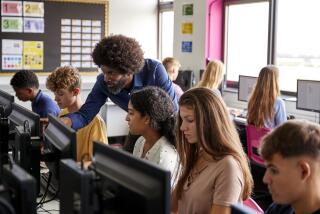Who’s Doing What on Home Computers? . . . Project NOAH Knows
- Share via
Home computing is a male activity, researchers calculate. Women shun the machine in the house and so do their daughters. Moreover, home computer owners sleep less than those who don’t own a machine. But they may spend more time with their children.
These are among the findings of Project NOAH, an Old Testament acronym that stands for a secular flood--the National Outlook for Automation in the Home. A two-year study of the emerging mores of the microchip, the ground-breaking project is monitoring a national sample of 907 generally affluent households--614 with computers and 293 without--to find out how people are programming their lives around new technology.
While the study won’t be wrapped up until after the final “wave” of data is collected in November, the preliminary findings are that men account for more than 60% of home computer use and male children for an additional 20%. Women and female children divide the rest of the time, accounting for about 13% and about 7%, respectively.
History Reflected
This seemingly sexist breakdown is actually a reflection of computer history, said Alladi Venkatesh, who along with Nicholas Vitalari is conducting the study at UC Irvine’s Graduate School of Management with $272,000 in funding from the National Science Foundation.
For much of its existence, the computer has been used for male-dominated “analytical” work such as science or engineering, Venkatesh said, adding that those are exactly the kinds of tasks that dominate home use. Furthermore, male dominance in home computing is culturally reinforced by fathers teaching sons to compute, he explained.
However--and perhaps predictably--Venkatesh said that the trend is likely to be reversed as more and more women either acquire computers, enter previously male-dominated professions, or both.
Whatever the sex of adult users, the home computer is most likely to be employed as an extension of the office and as such cuts down on personal free time formerly spent sleeping, television-watching, reading or in other activities, Venkatesh and Vitalari say in their preliminary report.
Most workers, more than 80%, spend less than 20 hours per week on job-related tasks at home but about 10% used the computer more than 21 hours a week. The bulk of the work is word-processing such as report writing. Other uses, in order, are other job-related work at home, writing computer programs, games and entertainment, education and home finance.
Moreover, persons owning a computer are much more likely to work at home. The study indicates that 80% of computer owners do work at home while about 60% of non-computer owners do so. And computer owners are likely to spend twice as much time working at home as those who don’t own a computer, the report said.
“Home computer technology still has a work bias,” Venkatesh said.
“The people who are manufacturing the computers have very little knowledge of what a home is,” he added, explaining that while IBM and others know office needs intimately, these companies haven’t figured out very many computer functions that are strictly relevant to the home. This is probably a big reason the home computer revolution is developing more slowly than expected, he said.
A Family Attraction
Nonetheless, home computers apparently draw the family together around the screen at home.
Twenty-nine percent of those in the researchers’ sample “believe that the computer has increased interaction among family members.” Even more, 41%, believed that “the computer has increased parental interaction with children.” But 18% said the computer decreased time spent with the family and 14% reported that time spent with children had decreased.
Adults who own a computer are strong believers in the machine’s educational value, but children may not practice what their elders preach. About 90% of the total adult sample said they believe that “computers are essential to children’s education and do not inhibit a child’s creativity.”
Yet only 50% of households with children reported that their computers were used for education, while 54% reported that the machines were used for games. The most common educational uses were mathematics, typing skills, computer programming and spelling skills.
Then there’s the baby-sitting factor. About 40% “believe that the computer has has replaced the television as a major source of children’s activity” and that “the computer keeps their children occupied and out of trouble,” the report said.
Subtle Effects
What all of this may mean to the society in general isn’t exactly clear at the moment, partly because the researchers themselves say their purpose is not dramatic. “We’re not looking for sensational results,” Venkatesh said, noting that the computer’s effects are often subtle and its impact long-range.
Clearly, he said, more and more people will be doing some portion of their work at home. But this trend is likely to be mainly limited to those who already use computers at work. “If you’re a factory worker, computing is not going to make much of a difference,” Venkatesh said.
What worries Venkatesh is that society could eventually develop into a two-tier class system of those who use computers and those who don’t. It may eventually be necessary to come up with a national policy that assures computer access to all, he said, explaining that such policies already have been adopted by France, Sweden and Norway, he said.
“This is a major question for the next 10 years,” Venkatesh said. “What if we become a society of knowledge-based and non-knowledge-based people?”






